Unit 2 I’m in New York now 课件(43张PPT)
文档属性
| 名称 | Unit 2 I’m in New York now 课件(43张PPT) |
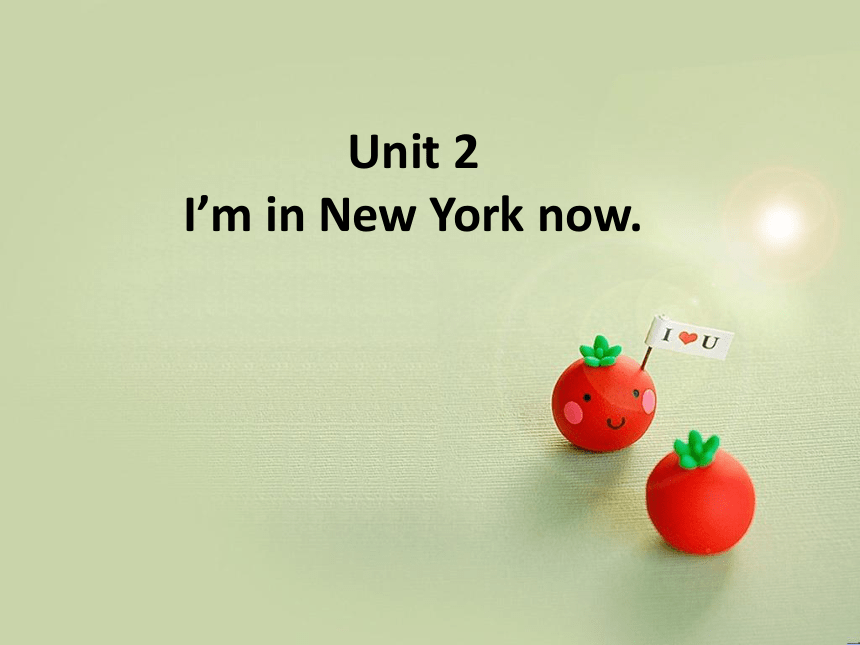
|
|
| 格式 | zip | ||
| 文件大小 | 5.2MB | ||
| 资源类型 | 教案 | ||
| 版本资源 | 外研版(三年级起点) | ||
| 科目 | 英语 | ||
| 更新时间 | 2019-03-27 00:00:00 | ||
图片预览

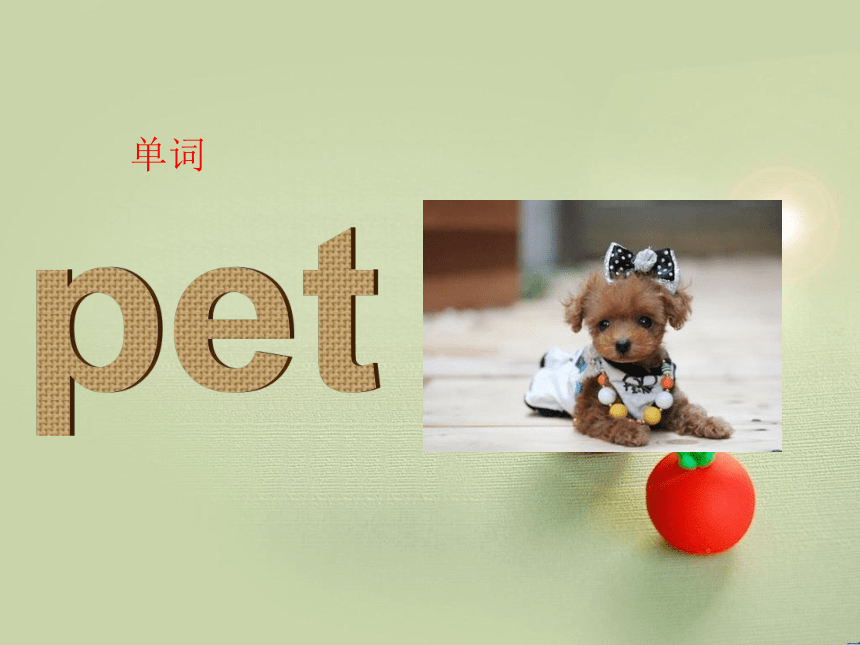
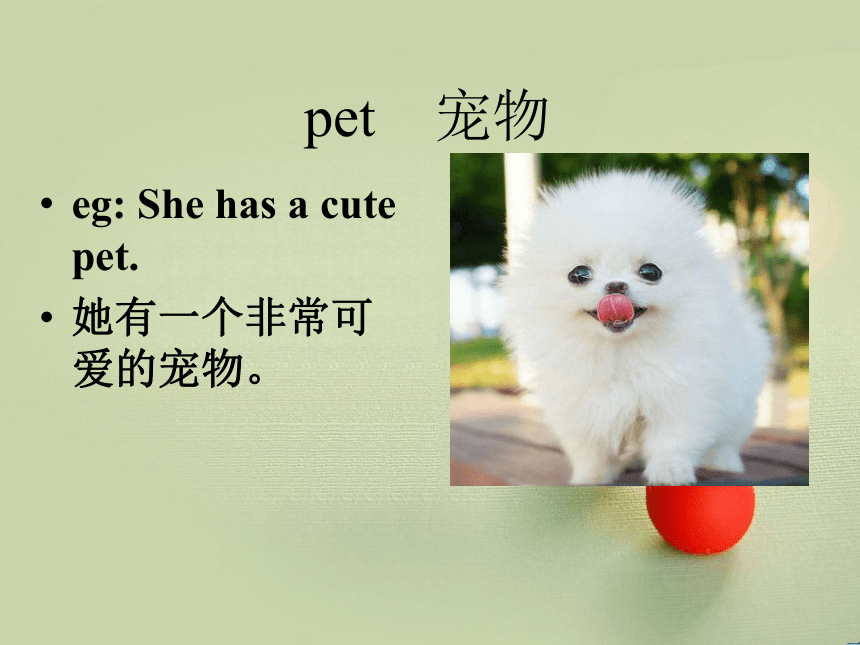

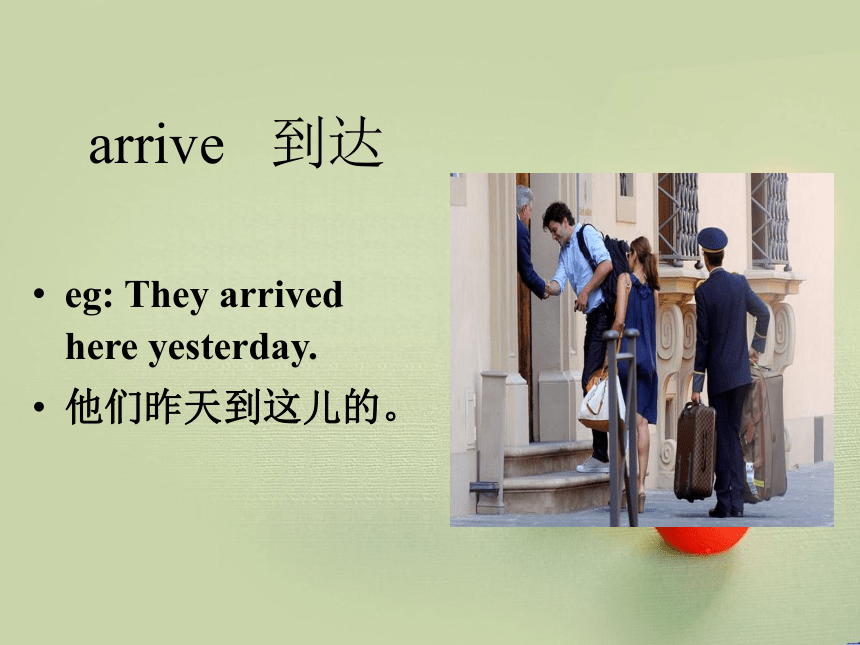

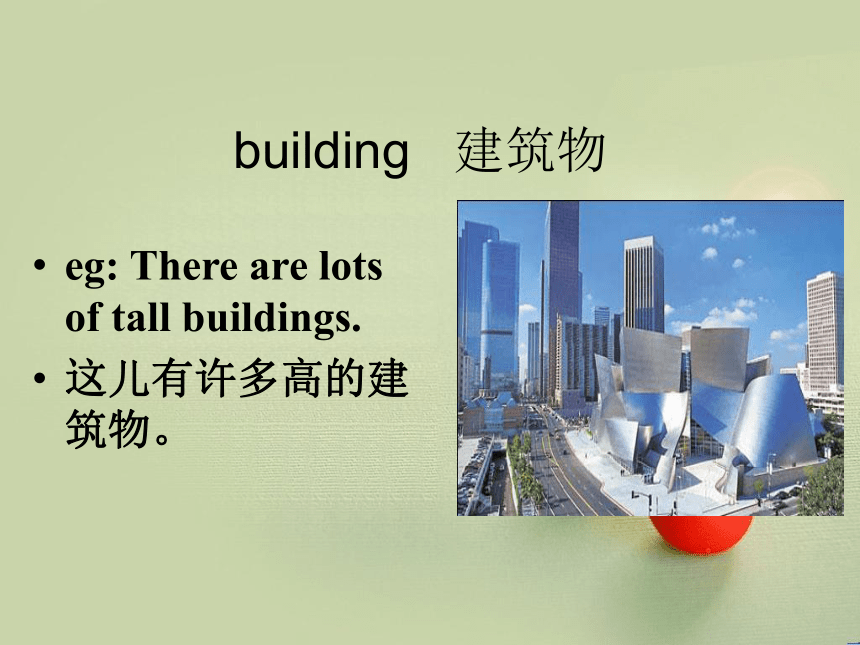
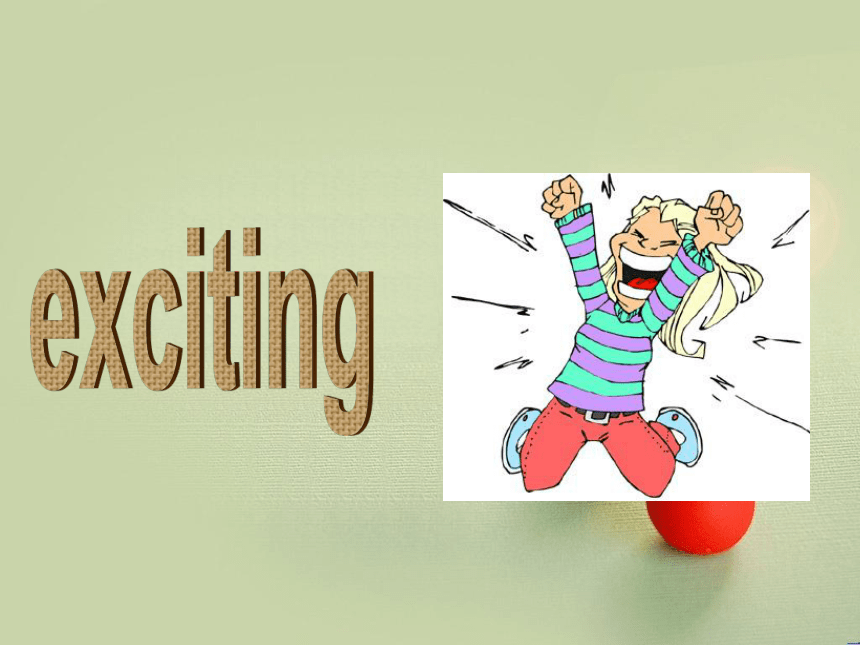


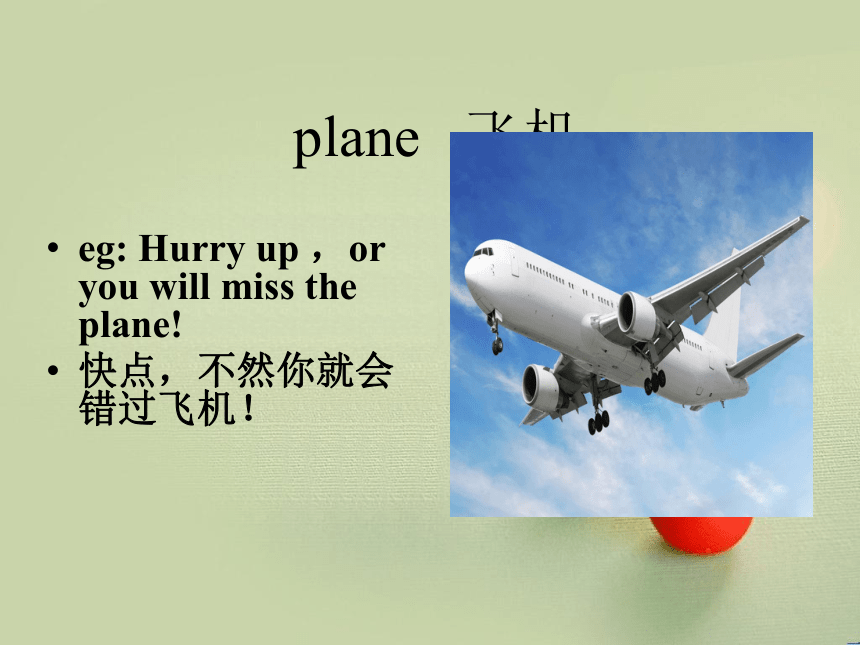
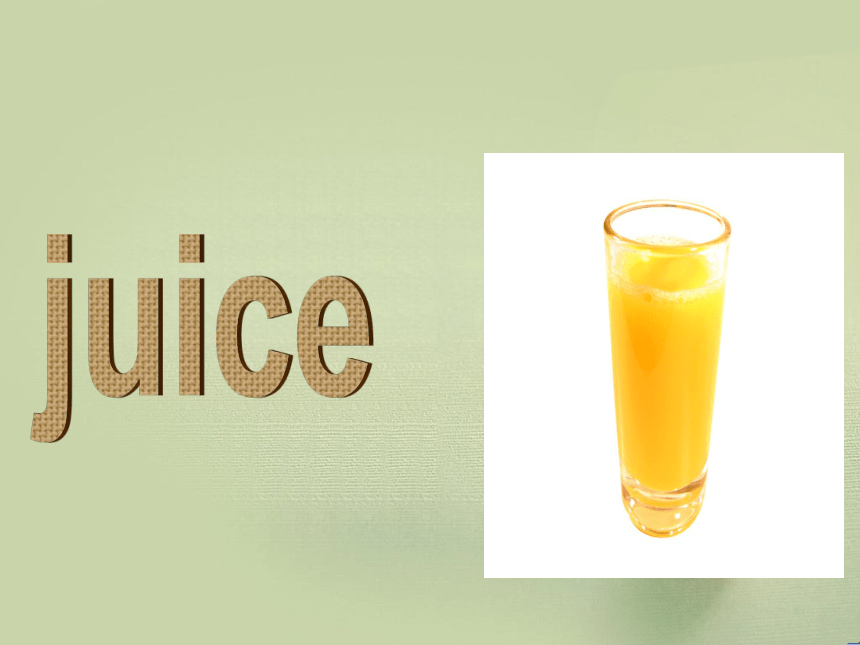
文档简介
课件43张PPT。Unit 2
I’m in New York now.pet单词pet 宠物 eg: She has a cute pet.
她有一个非常可爱的宠物。
arrivearrive 到达eg: They arrived here yesterday.
他们昨天到这儿的。buildingsbuilding 建筑物eg: There are lots of tall buildings.
这儿有许多高的建筑物。excitingexciting 令人激动的eg: The movie is exciting.
这部电影令人激动。planeplane 飞机eg: Hurry up ,or you will miss the plane!
快点,不然你就会错过飞机!
juicejuice 果汁eg: I would like a cup of juice.
我要一杯果汁。Look , listen and sayThis is my new pet. It speaks English.Hello! Hello! Nihao! Nihao!Wow! It speaks Chinese too.Listen and readDear Mum and Dad,
I’m in New York now. I arrived here yesterday. I’m very happy. Grandma and Cousin Simon met me at the airport. We took a yellow taxi to their home.
New York is very beautiful. There are lots of tall buildings, cars and people.
Grandma made Chinese food for me. But I want to try American food. I want to find out more about the US. I will write again soon.
Love,
DamingNow answer the questions1. Where is Daming now?
2. When did Daming arrive there?
3. Who met Daming at the airport?
4. What food did Grandma make for Daming?Answers:1. Daming is in New York now.
2. He arrived there yesterday.
3. Grandma and Cousin Simon met Daming at the airport.
4. Grandma made Chinese food for Daming.Listen and sayIT’S A BIG EXCITING WORLD
I’m in the sky.
I’m flying high.
It’s a big exciting world.
There’s new food to eat, new people to meet.
It’s a big exciting world.
I will travel by plane, again and again.
It’s a big exciting world.Listen and say. Then singFollow and say We’re going to have a party.
I’m going to sing a song.We’re going to have a party.
He’s going to sing a song. I’m going to play a game. We’re going to have a party. He’s going to sing a song. She’s going to play a game. I...Do, write and say Make a plan for the weekend. Then write and tell the class
about it.I'm going to the zoo this Saturday. I'm going to take bread and juice. There are some funny animals at the zoo. I want to take lots of photos.一般过去时一般现在时一般将来时综合复习表示经常或者反复发生的动作
often(经常) sometimes(有时)
always(总是) usually(通常)
every day(每天) every week(每周)
every month(每月) every term(每学期)
every year(每年) once a week (一周一次)
twice a year(一年两次) 信息词:一般现在时:Present Simple定义:
一般现在时:1、表达经常性或习惯性的动作。
2、表示现在的状态。
例如:
1、我们每天都上学。
2、下课后我们打扫教室。
3、有时我们在操场上踢足球 。
4、我们在学校吃晚饭。
5、他喜欢英语。
6、他是一个学生。We go to school every day.We clean the classroom after class.
We sometimes play football on the playground.We have dinner at school.He likes English.He is a student.用所给动词的适当形式填空:1.?We often___________(play) on the playground.
2.?He _________(get) up at six o’clock.
3.?______you ______(brush) your teeth every morning?
4.What?____?(do) he usually?_____ (do) after school?
5. Danny ______(study) English, Maths and Science Art.
6.He sometimes ________(go) to the park with his sister.
7. At 8:00 A.M, she _______(watch) TV with her parents.
8.?________ Mike________(read) English every day?
9.?How many lessons ______ your classmate_______ (have) on Monday?
10.??What time ______ his mother_________(do) the housework?playgetsDo brushdoesdostudiesgoeswatchesDoes readdoeshavedoesdo改句子1.??Do you often play football after school? (肯定回答)
2.?I have many books.??(改为否定句)
3.?His sister likes playing table tennis. (改为否定句)
4.? Nancy doesn’t run fast. (肯定句)
5.?I watch TV every day. (改为一般疑问句)
6.?David has a goal. (改为一般疑问句)
7.?We have four lessons.(否定句)Yes, I do .
I don’t have many books.?
His sister doesn’t like playing table tennis.
Nancy runs fast .
Do you watch TV every day?
Does David have a goal ?
We don’t have four lessons.对下列句子划线部分提问:I get up at six o’clock.
They usually go to the park on Sunday.
The elephants like eating fruits.
He sends two emails every week.
5.He has lunch at school.
When do you get up?What do they usually do on Sunday?What do the elephants like eating?How many emails does he send every week?How often does he send two emails?Who has lunch at school?Where does he have lunch?Let’s correct (改错):
I goes to school at six every day.
He don’t like playing football.
3. They likes playing games.
4. Daming watchs TV in the evening.
5. Does he usually has a party?
6. What do they on Sunday?
7. Tony goes always to school at eight o’clock.
8. What they eat in the party?
9. Lily haves lunch at school.godoesn’tlikewatcheshavedo on Sundayalways goesdohas表示过去发生的动作或存在的状态一般过去时:Past Simple行为动词的一般过去时:陈述句:主语+动词过去式+其它She did homework yesterday .否定句:主语+助动词didn’t+动词原形+其它She didn’t do homework yesterday.一般疑问句:Did +主语+动词原形+其它Did she do homework yesterday?
Yes,she did./No,she didn’t.常与一般过去时连用的时间有:yesterday
yesterday morning (afternoon, evening…)
last night (week, month, year…)
two days ago, a week ago, three years ago…
in 1990 (in 1998…)常用时间规则动词的过去式变化规则一般在词尾加—edplay→played以不发音的e结尾的,只加-d以辅音字母+y 结尾的,变y为i ,再加—ed以一个辅音字母结尾的重读闭音节,先双写这个辅音字母,再加-ed句型转换:
1 Mr Li invited her to the party.(改为一般疑问句)
Mr Li her to the party?
2 They asked the teacher a question.(改为否定句)
They the teacher a question.
3 Tom watched TV for two hours.(对画线部分提问)
Tom TV?
4 She helped me do some cleaning.(对画线部分提问)
She you ?Didinvitedidn’t askHow long did watchWhat did helpdoPRACTISE改写句子:
1、Lucy did her homework at home.(改否定句)
Lucy _______ _______ her homework at home.
2、He found some meat in the fridge.(变一般疑问句)
______ he _____ ______ meat in the fridge?
3、She stayed there for a week.(对划线部分提问)
______ ______ _____ she _____ there?
4、There was some orange in the cup.(变一般疑问句)
_____ there _____ orange in the cup? didn’t do
Did find any
How long did stay
Was any一般将来时:The Simple Future Tense
常用形式:
be going to+动词原形
will+动词原形
“be going to”和“will”的区别:
“be going to + 动词原形”表示打算或计划将来要做的事
“will+动词原形”表示将要发生的动作或存在的状态,或表示一种愿望。
在I think, I hope等后面的从句一般用will来表示将要做或将要发生的事情。
will 引导的一般将来时:表示将来发生的动作或存在的状态,最基本的结构:will + 动词原形
“主谓(宾)句型”的一般将来时:
肯定句:主语+ will +动词原形+(宾语)+其他
Some day people will go to the moon .
否定句:在will 的后面加not即可。will not 可缩写为 won’t
Some day people will not go to the moon .
一般疑问句:把will 提到句子主语之前,结尾变问号。
Will Some day people go to the moon ? 特殊疑问句:特殊疑问词+will +主语+动词原形+其他?
Where will some people go ?
1)我打算明天和我的朋友去旅行。
I go on a trip with my friends tomorrow.
I go on a trip with my friends tomorrow.
2)下个星期一你打算去干嘛? 我想去打篮球。
---What next Monday?
---I play basketball.
---What you do next Monday?
I _____ play basketball.
3)你妈妈这个周末去购物吗?是,她要去买一些水果。
--- your mother go shopping this ?
---Yes, she . She buy some fruit. 练一练:Practiseam going towillare you going to doam going towillwill Is going toisis going toweekend改写句子1)Nancy is going to go camping.(改否定句)
Nancy _________ going to go camping.
2)I’ll help them.(改否定句)
I _________ help them.
3)I’m going to get up at 6:30 tomorrow.(一般疑问句)
_________ you ______ to get up at 6:30 tomorrow?
4)We will meet at the stop at 10:30.(改一般疑问句)
_________ you ______ at the bus stop at 10:30?
5)She’s going to listen to music after school(划线提问)
_________ is she going to _________ after school? isn’t won’t Are goingWill meetWhat do本单元你学到了什么,快来总结一下吧!
I’m in New York now.pet单词pet 宠物 eg: She has a cute pet.
她有一个非常可爱的宠物。
arrivearrive 到达eg: They arrived here yesterday.
他们昨天到这儿的。buildingsbuilding 建筑物eg: There are lots of tall buildings.
这儿有许多高的建筑物。excitingexciting 令人激动的eg: The movie is exciting.
这部电影令人激动。planeplane 飞机eg: Hurry up ,or you will miss the plane!
快点,不然你就会错过飞机!
juicejuice 果汁eg: I would like a cup of juice.
我要一杯果汁。Look , listen and sayThis is my new pet. It speaks English.Hello! Hello! Nihao! Nihao!Wow! It speaks Chinese too.Listen and readDear Mum and Dad,
I’m in New York now. I arrived here yesterday. I’m very happy. Grandma and Cousin Simon met me at the airport. We took a yellow taxi to their home.
New York is very beautiful. There are lots of tall buildings, cars and people.
Grandma made Chinese food for me. But I want to try American food. I want to find out more about the US. I will write again soon.
Love,
DamingNow answer the questions1. Where is Daming now?
2. When did Daming arrive there?
3. Who met Daming at the airport?
4. What food did Grandma make for Daming?Answers:1. Daming is in New York now.
2. He arrived there yesterday.
3. Grandma and Cousin Simon met Daming at the airport.
4. Grandma made Chinese food for Daming.Listen and sayIT’S A BIG EXCITING WORLD
I’m in the sky.
I’m flying high.
It’s a big exciting world.
There’s new food to eat, new people to meet.
It’s a big exciting world.
I will travel by plane, again and again.
It’s a big exciting world.Listen and say. Then singFollow and say We’re going to have a party.
I’m going to sing a song.We’re going to have a party.
He’s going to sing a song. I’m going to play a game. We’re going to have a party. He’s going to sing a song. She’s going to play a game. I...Do, write and say Make a plan for the weekend. Then write and tell the class
about it.I'm going to the zoo this Saturday. I'm going to take bread and juice. There are some funny animals at the zoo. I want to take lots of photos.一般过去时一般现在时一般将来时综合复习表示经常或者反复发生的动作
often(经常) sometimes(有时)
always(总是) usually(通常)
every day(每天) every week(每周)
every month(每月) every term(每学期)
every year(每年) once a week (一周一次)
twice a year(一年两次) 信息词:一般现在时:Present Simple定义:
一般现在时:1、表达经常性或习惯性的动作。
2、表示现在的状态。
例如:
1、我们每天都上学。
2、下课后我们打扫教室。
3、有时我们在操场上踢足球 。
4、我们在学校吃晚饭。
5、他喜欢英语。
6、他是一个学生。We go to school every day.We clean the classroom after class.
We sometimes play football on the playground.We have dinner at school.He likes English.He is a student.用所给动词的适当形式填空:1.?We often___________(play) on the playground.
2.?He _________(get) up at six o’clock.
3.?______you ______(brush) your teeth every morning?
4.What?____?(do) he usually?_____ (do) after school?
5. Danny ______(study) English, Maths and Science Art.
6.He sometimes ________(go) to the park with his sister.
7. At 8:00 A.M, she _______(watch) TV with her parents.
8.?________ Mike________(read) English every day?
9.?How many lessons ______ your classmate_______ (have) on Monday?
10.??What time ______ his mother_________(do) the housework?playgetsDo brushdoesdostudiesgoeswatchesDoes readdoeshavedoesdo改句子1.??Do you often play football after school? (肯定回答)
2.?I have many books.??(改为否定句)
3.?His sister likes playing table tennis. (改为否定句)
4.? Nancy doesn’t run fast. (肯定句)
5.?I watch TV every day. (改为一般疑问句)
6.?David has a goal. (改为一般疑问句)
7.?We have four lessons.(否定句)Yes, I do .
I don’t have many books.?
His sister doesn’t like playing table tennis.
Nancy runs fast .
Do you watch TV every day?
Does David have a goal ?
We don’t have four lessons.对下列句子划线部分提问:I get up at six o’clock.
They usually go to the park on Sunday.
The elephants like eating fruits.
He sends two emails every week.
5.He has lunch at school.
When do you get up?What do they usually do on Sunday?What do the elephants like eating?How many emails does he send every week?How often does he send two emails?Who has lunch at school?Where does he have lunch?Let’s correct (改错):
I goes to school at six every day.
He don’t like playing football.
3. They likes playing games.
4. Daming watchs TV in the evening.
5. Does he usually has a party?
6. What do they on Sunday?
7. Tony goes always to school at eight o’clock.
8. What they eat in the party?
9. Lily haves lunch at school.godoesn’tlikewatcheshavedo on Sundayalways goesdohas表示过去发生的动作或存在的状态一般过去时:Past Simple行为动词的一般过去时:陈述句:主语+动词过去式+其它She did homework yesterday .否定句:主语+助动词didn’t+动词原形+其它She didn’t do homework yesterday.一般疑问句:Did +主语+动词原形+其它Did she do homework yesterday?
Yes,she did./No,she didn’t.常与一般过去时连用的时间有:yesterday
yesterday morning (afternoon, evening…)
last night (week, month, year…)
two days ago, a week ago, three years ago…
in 1990 (in 1998…)常用时间规则动词的过去式变化规则一般在词尾加—edplay→played以不发音的e结尾的,只加-d以辅音字母+y 结尾的,变y为i ,再加—ed以一个辅音字母结尾的重读闭音节,先双写这个辅音字母,再加-ed句型转换:
1 Mr Li invited her to the party.(改为一般疑问句)
Mr Li her to the party?
2 They asked the teacher a question.(改为否定句)
They the teacher a question.
3 Tom watched TV for two hours.(对画线部分提问)
Tom TV?
4 She helped me do some cleaning.(对画线部分提问)
She you ?Didinvitedidn’t askHow long did watchWhat did helpdoPRACTISE改写句子:
1、Lucy did her homework at home.(改否定句)
Lucy _______ _______ her homework at home.
2、He found some meat in the fridge.(变一般疑问句)
______ he _____ ______ meat in the fridge?
3、She stayed there for a week.(对划线部分提问)
______ ______ _____ she _____ there?
4、There was some orange in the cup.(变一般疑问句)
_____ there _____ orange in the cup? didn’t do
Did find any
How long did stay
Was any一般将来时:The Simple Future Tense
常用形式:
be going to+动词原形
will+动词原形
“be going to”和“will”的区别:
“be going to + 动词原形”表示打算或计划将来要做的事
“will+动词原形”表示将要发生的动作或存在的状态,或表示一种愿望。
在I think, I hope等后面的从句一般用will来表示将要做或将要发生的事情。
will 引导的一般将来时:表示将来发生的动作或存在的状态,最基本的结构:will + 动词原形
“主谓(宾)句型”的一般将来时:
肯定句:主语+ will +动词原形+(宾语)+其他
Some day people will go to the moon .
否定句:在will 的后面加not即可。will not 可缩写为 won’t
Some day people will not go to the moon .
一般疑问句:把will 提到句子主语之前,结尾变问号。
Will Some day people go to the moon ? 特殊疑问句:特殊疑问词+will +主语+动词原形+其他?
Where will some people go ?
1)我打算明天和我的朋友去旅行。
I go on a trip with my friends tomorrow.
I go on a trip with my friends tomorrow.
2)下个星期一你打算去干嘛? 我想去打篮球。
---What next Monday?
---I play basketball.
---What you do next Monday?
I _____ play basketball.
3)你妈妈这个周末去购物吗?是,她要去买一些水果。
--- your mother go shopping this ?
---Yes, she . She buy some fruit. 练一练:Practiseam going towillare you going to doam going towillwill Is going toisis going toweekend改写句子1)Nancy is going to go camping.(改否定句)
Nancy _________ going to go camping.
2)I’ll help them.(改否定句)
I _________ help them.
3)I’m going to get up at 6:30 tomorrow.(一般疑问句)
_________ you ______ to get up at 6:30 tomorrow?
4)We will meet at the stop at 10:30.(改一般疑问句)
_________ you ______ at the bus stop at 10:30?
5)She’s going to listen to music after school(划线提问)
_________ is she going to _________ after school? isn’t won’t Are goingWill meetWhat do本单元你学到了什么,快来总结一下吧!
同课章节目录
- Module 1
- Unit 1 We lived in a small house.
- Unit 2 She didn't have a television.
- Module 2
- Unit 1 She learnt English.
- Unit 2 Mr Li was a teacher.
- Module 3
- Unit 1 She had eggs and sausages.
- Unit 2 Sam ate four hamburgers.
- Module 4
- Unit 1 Let's make a home library.
- Unit 2 We can find information from books and CDs.
- Module 5
- Unit 1 It's big and light.
- Unit 2 It's too big for you.
- Module 6
- Unit 1 I went there last year.
- Unit 2 She visited the Tianchi Lake.
- Module 7
- Unit 1 My father goes to work at eight o'clock eve
- Unit 2 I'll be home at seven o'clock.
- Module 8
- Unit 1 Will you help me?
- Unit 2 I made a kite.
- Module 9
- Unit 1 We laughed a lot.
- Unit 2 Mum bought new T-shirts for you.
- Module 10
- Unit 1 Where are you going to go?
- Unit 2 I'm in New York now.
- Review Module
- Unit 1
- Unit 2
